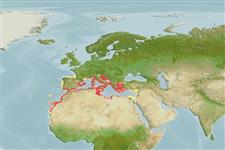Environment: milieu / climate zone / depth range / distribution range
पारिस्थितिकी
समुद्री ड़िमरसल; गहराई सीमा 5 - 100 m (Ref. 2739). Subtropical; 45°N - 12°N, 19°W - 36°E
Eastern Atlantic: Portugal and the Canary Islands, south to Senegal. Also throughout the western and the eastern Mediterranean.
Length at first maturity / आकार / वज़न / Age
Maturity: Lm 7.8 range ? - ? cm
Max length : 25.0 cm TL पुल्लिंग / अलिंग; (Ref. 2739); common length : 15.0 cm TL पुल्लिंग / अलिंग; (Ref. 26999)
Found over seagrass, sand, mud and rocks (Ref. 2739). Carnivorous, decapods dominate the diet. Adapts well in an aquarium (Ref. 12382). A synchronous hermaphrodite (Ref. 56921).
Manifests synchronous hermaphroditism, particularly, differentiation of the ovary is earlier than that of the testis (Ref. 56921).
Smith, C.L., 1990. Serranidae. p. 695-706. In J.C. Quero, J.C. Hureau, C. Karrer, A. Post and L. Saldanha (eds.) Check-list of the fishes of the eastern tropical Atlantic (CLOFETA). JNICT, Lisbon; SEI, Paris; and UNESCO, Paris. Vol. 2. (Ref. 3589)
IUCN Red List Status (Ref. 130435)
Threat to humans
Harmless
Human uses
मात्स्यिकी: लघु वाणिज्य; जलजीवालय: व्यापारिक
अधिक जानकारी
संदर्भजलीयकृषिजलीयकृषि रूपरेखाखींचआनुवंशिकीElectrophoresesहैरेटिबिलटीबीमारीप्रक्रमणNutrientsMass conversion
साधन
Special reports
Download XML
इंटरनेट स्रोत
Estimates based on models
Preferred temperature (Ref.
123201): 14.3 - 21, mean 18.3 °C (based on 184 cells).
Phylogenetic diversity index (Ref.
82804): PD
50 = 0.5000 [Uniqueness, from 0.5 = low to 2.0 = high].
Bayesian length-weight: a=0.01175 (0.01013 - 0.01363), b=3.04 (3.00 - 3.08), in cm total length, based on LWR estimates for this species (Ref.
93245).
Trophic level (Ref.
69278): 3.5 ±0.4 se; based on diet studies.
लौटाव (Ref.
120179): माध्यम, न्यूनतम जनसंख्या दुगनी होने का समय 1.4 - 4.4 वर्ष। (Preliminary K or Fecundity.).
Fishing Vulnerability (Ref.
59153): Low vulnerability (24 of 100).
Nutrients (Ref.
124155): Calcium = 120 [45, 238] mg/100g; Iron = 1.18 [0.64, 2.23] mg/100g; Protein = 18.3 [16.5, 20.0] %; Omega3 = 0.411 [0.259, 0.697] g/100g; Selenium = 25.2 [13.4, 49.3] μg/100g; VitaminA = 16.4 [5.4, 56.6] μg/100g; Zinc = 0.882 [0.622, 1.305] mg/100g (wet weight);
